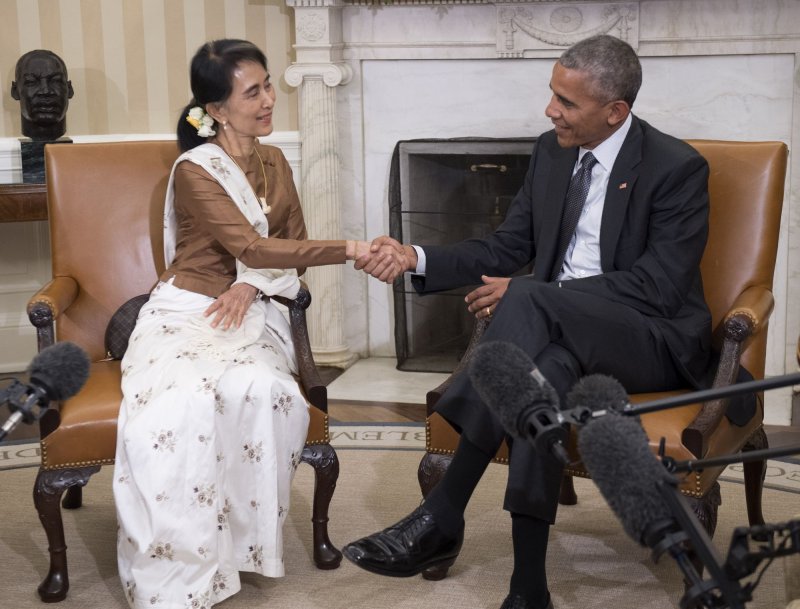1 of 2 | U.S. President Barack Obama shakes hands with Myanmar State Counsellor Aung San Suu Kyi during their talks in the Oval Office of the White House on Wednesday. Photo by Pat Benic/UPI |
License Photo
The Obama administration's decision to lift nearly all sanctions on Myanmar before addressing ongoing worker and human rights abuses and the military's continued role in the country greatly limits the tools that Myanmar's democratic leaders, unions and civil society organizations possess to ensure an irreversible move toward democracy.
Although recent years have shown definite advances toward democracy and rule of law, the transition remains precarious due to continued military actions against ethnic and religious minorities and the military's control over government ministries and key sectors like mining, minerals, gas and oil.
The sanctions have been an important leverage-creating tool to support ongoing democratic reforms. Many of the sanctions that restricted Burmese imports, financial institutions and U.S. investments were lifted between 2012 and 2016, but the few that remained were important to pressuring the military to support the reforms. In 2013, the United States established the "Reporting Requirement on Responsible investment in Burma", as the country was formerly known, to collect information and assess whether or not investments made by U.S. corporations undermined the country's democratic transition. The use of the U.S. Department of Treasury's "Specially Designated Nationals" list prevented corrupt individuals and entities from benefiting from international investment. Without these tools, corrupt businesses seeking to exploit Myanmar workers and the country's natural resources will be permitted to act with impunity.
For years, the AFL-CIO and the global labor movement have worked closely with Myanmar partners to support democratic union and civil society organizations and document and address the ongoing use of forced labor in the country that supports and helps maintains military rule. Forced labor has been used in development projects, agriculture and military businesses. It has been used to impose collective punishment on entire communities, as the military threatened unions and civil society organizations in retaliation for criticizing human rights violations. Forced labor also enabled highly profitable and exploitative development and business arrangements that enriched the military junta. Today these practices continue, most notably in the west of Myanmar in Rakhine state, where the military forces the Rohingya minority to build and maintain
military businesses and infrastructure. Removing remaining sanctions decreases the leverage the new democratic leadership has to ensure these acts of modern-day slavery cease.
Myanmar stands at a critical juncture. As the country takes important steps toward democracy and the rule of law, the international community must continue to provide tools that ensure that human and worker rights and the respect for the country's natural resources create the foundation for a truly inclusive, democratic Myanmar.















